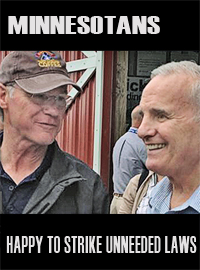| Minnesota’s First “Unsession” Repeals 1,175 Laws |
 |
|
By Ashton Ellis
Thursday, June 05 2014 |
In an era when most liberals are busy trying to grow government, Democratic leaders in Minnesota just struck 1,175 laws from the books. Democratic Governor Mark Dayton pitched the idea of a legislative “unsession” last fall as a way to update and simplify the state’s regulatory structure. Dayton, who is running for reelection this year, wanted to work less on big social engineering projects and instead focus on more down-to-earth issues like eliminating outdated laws, reforming the business permitting process and putting regulations in plain language. Working with Republicans and Democrats, Dayton approved the elimination of more than 1,100 obsolete or redundant laws. Some of the most extreme examples included a misdemeanor for carrying fruit in an illegally sized container; dozens of laws regulating the telegraph industry; and a law from 1937 forbidding motorists to drive in neutral (which is impossible to do). Pruning these and other unnecessary laws, while tedious, is important for two reasons. First, as in the case of the outdated telegraph and motorist laws, it helps drive home the point that regulatory schemes need to be flexible and constantly monitored because technology is constantly evolving. Too often politicians – and the public – try to control a new product or process with policies and agencies that entrench the status quo. Forgotten in the rush to regulate is the fact that specific laws are nothing more than applications of timeless principles like fair play and full disclosure. The other important benefit is that government officials get to see just how comical it is to pass judgment on so many trivial matters. It’s hard to fathom the rationale that convinced a majority of legislators and a governor to criminalize certain sizes of fruit containers. Probably there was an alleged public health risk, or perhaps it resulted in some financial boon to a container maker. Whatever the reason, it’s long since been irrelevant. However, modern politicians and bureaucrats shouldn’t laugh too hard at their predecessors. No doubt there are plenty of current rules that future lawmakers will abandon for lacking common sense. Dayton and the legislature also took a swing at reducing wait times for business permits. The biggest source of delay in any state is always an assessment of a business’s environmental impact. To make Minnesota more business friendly a two-tiered system was created. Most general and registration permits – an estimated 11,000 per year – will now be processed in 90 days or less. Specialty permits – meaning those involving construction – will now be completed in 150 days or less. And then there’s Dayton’s executive order requiring state agencies to “use commonly-used language, write in clear and complete sentences and present information in a format that is easy-to-understand,” according to a fact sheet on the governor’s website. The results have been commendable. The policy inspired state agencies to join the digital age by launching new websites, converting dense manuals into mobile-friendly apps and converting documents riddled with legalize into easy-to-understand charts and summaries. Of course, there’s still room for improvement. Conservatives in Minnesota point to Dayton and the Democrats’ potentially hypocritical stance on weeding out waste but leaving untouched a $90 million project to build a new office building for politicians. Another sore point is Dayton’s refusal to downsize the state’s public employee count even though some of the unsession’s reforms reduced the state’s workload. Finally, there’s the timing of Dayton’s embrace of smaller, more efficient government. Critics rightly acknowledge there is clearly a political benefit to the governor appearing to be pro-business and pro-taxpayer as he launches his reelection campaign. All of these criticisms have merit. But shouldn’t conservatives welcome any liberal efforts to streamline government operations? Doing so moves the policy debate onto ground conservatives already own. Moreover, the bipartisan nature of these reforms increases the odds that they will stick since it benefits liberals nothing to undo them in the future. Here’s hoping Mark Dayton uses the unsession to run as a pro-business, pro-taxpayer reformer and dares his GOP challenger to outdo him. These are terms any conservative should relish. |
Related Articles : |
























